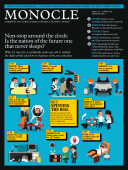
Issue 41
Our new issue takes a hard look at the working day around the world and asks whether being open-all-hours is better than sticking to the 9-to-5.
In This Issue
Oops! No content was found.
Looks like we no longer have content for the page you're on. Perhaps try a search?
Return Home

